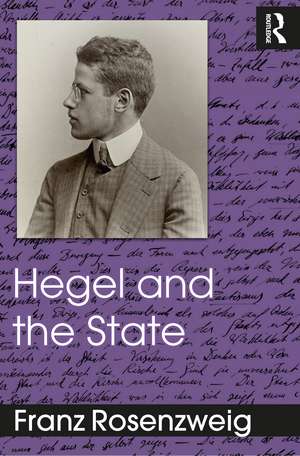Hegel and the State
Autor Franz Rosenzweig Traducere de Josiah Simon, Jules Simonen Limba Engleză Hardback – 30 noi 2023
Through careful readings of Hegel’s early handwritten manuscripts, Rosenzweig shows that Hegel was wrestling with the problem of how to reconcile the subjectivity and freedom of the individual within a community and ultimately the political state. According to Rosenzweig, the route out of this conundrum chosen by Hegel shaped his mature political philosophy, where he saw the relationship between the individual and the state as reciprocal. At a deeper level, the significance of Hegel and the State lies in the way that Rosenzweig explains the failure of Hegel's quasi-communitarian view of the state to emerge, due to the authoritarian direction of the newly unified German state under Bismarck. Anticipating the political and moral disaster that was to follow, Rosenzweig concludes by questioning the very viability of any theory of the state that relies on the pillars of bureaucratic militarism and a government-supported capitalist business culture.
With the inclusion of a Foreword by Myriam Bienenstock and a substantial Afterword by Axel Honneth, Hegel and the State is a ground-breaking work of early twentieth-century philosophical and political thought. It is essential reading for students of Hegel, German Idealism, Jewish philosophy, and the origins of critical theory. It will also be of interest to those in related subjects such as the history of sociology, and German and intellectual history.
Preț: 475.50 lei
Preț vechi: 516.85 lei
-8% Nou
Puncte Express: 713
Preț estimativ în valută:
91.00€ • 94.76$ • 76.91£
91.00€ • 94.76$ • 76.91£
Carte disponibilă
Livrare economică 18 februarie-04 martie
Livrare express 01-07 februarie pentru 37.47 lei
Preluare comenzi: 021 569.72.76
Specificații
ISBN-13: 9780367374969
ISBN-10: 036737496X
Pagini: 622
Dimensiuni: 156 x 234 x 42 mm
Greutate: 0.64 kg
Ediția:1
Editura: Taylor & Francis
Colecția Routledge
Locul publicării:Oxford, United Kingdom
ISBN-10: 036737496X
Pagini: 622
Dimensiuni: 156 x 234 x 42 mm
Greutate: 0.64 kg
Ediția:1
Editura: Taylor & Francis
Colecția Routledge
Locul publicării:Oxford, United Kingdom
Public țintă
General, Postgraduate, Undergraduate, and Undergraduate AdvancedCuprins
Foreword Myriam Bienenstock Translators’ Introduction Josiah Simon and Jules Simon Translators’ Acknowledgments. Preface Volume 1: Stations of Life (1770 – 1806) 1. Preliminary Remarks 2. Stuttgart 3. Tübingen 4. Bern 5. Two Political Writings 6. Frankfurt 7. Jena (until 1803) 8. Jena (after 1804) Volume 2: Epochs of the World (1806-1831) 9. Napoleon 10. Restoration 11. Prussia 12. July Revolution 13. Concluding Remarks. Afterword Axel Honneth Translators’ Note on Abbreviations and Secondary Sources Abbreviations Secondary Sources Translators’ Bibliography. Index
Recenzii
'This remarkable book by one of the twentieth century’s leading philosophers and religious thinkers, available for the first time in English translation, is essential reading for anyone who wants to understand how the relationship between political and religious thought has shaped our world. For those who are interested in Hegel’s political philosophy, Rosenzweig’s book is an illuminating account of the development and political context of a way of thinking that remains relevant today. For those who are interested in Rosenzweig’s own religiously inflected thought, this volume shows both the great promise and the crushing disappointment of the German political project that is the prelude to his masterwork, The Star of Redemption.' - Paul Franks, Yale University, USA
'The best book on Hegel’s political philosophy is Franz Rosenzweig’s Hegel und der Staat, which first appeared in 1920. It is the most thorough in its research, the most extensive in its coverage, and the most rigorous in exposition and argument. Despite these merits, the book has not been translated into English—until now. It appears here in a reliable and accurate translation by Josiah and Jules Simon. This is a major event in Hegel scholarship, and a major contribution to the study of Hegel in the English-speaking world.' - Frederick Beiser, Syracuse University, USA
'The best book on Hegel’s political philosophy is Franz Rosenzweig’s Hegel und der Staat, which first appeared in 1920. It is the most thorough in its research, the most extensive in its coverage, and the most rigorous in exposition and argument. Despite these merits, the book has not been translated into English—until now. It appears here in a reliable and accurate translation by Josiah and Jules Simon. This is a major event in Hegel scholarship, and a major contribution to the study of Hegel in the English-speaking world.' - Frederick Beiser, Syracuse University, USA
Notă biografică
Franz Rosenzweig (1886–1929) is one of the most original Jewish thinkers of the modern period. Following the First World War, he sought to bring about a novel synthesis of philosophy and theology he termed the "new thinking," shaping the course of early twentieth-century Jewish and Christian dialogue. His engagement with the theme of human finitude made a lasting impact on twentieth-century existentialism and he undertook two major works of translation, most notably the German translation of the Hebrew Bible in which he collaborated with Martin Buber. He founded a center for Jewish adult education in Frankfurt – the Lehrhaus – which attracted the most important young German Jewish intellectuals of its time and which is still held up today as a model for educational programs of its type. His life is marked by several extraordinary personal experiences, including a near-conversion to Christianity, an inspired return to Judaism, the composition of the beginning of his magnum opus on military postcards sent home from the Balkan front and the abandonment of a promising academic career in order to live and teach in the Frankfurt Jewish community. As well as Hegel and the State (1920), he is the author of what is arguably the greatest work of modern Jewish philosophy: The Star of Redemption (1921).
Descriere
Available in English for the first time, this major contribution to the study of Hegel's political and social thought gives insight on the intellectual currents that shaped the German state in the late 19th and early 20th centuries. Includes a Foreword by Myriam Bienenstock and an Afterword by Axel Honneth.
